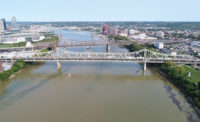Jersey City, N.J. will spend more than $1.1 billion in lead water service line replacements and sewer upgrades over the next decade as part of a modified consent decree with the U.S. Environmental Protection Agency, announced Jan. 27.
EPA officials said the settlement between the Jersey City Municipal Utilities Authority and the U.S. government will reduce pollution discharged into the Hackensack and Hudson rivers, as well as Newark Bay, and will improve water quality in communities that traditionally have been disproportionately affected by water pollution.
The authority had signed the consent decree with EPA and the Justice Dept. in 2011 to address Clean Water Act violations related to not properly operating and maintaining its combined sewer system, which led to repeated releases of untreated sewage into water bodies. That agreement also required the city to assess the condition of its sewer system.
The new settlement incorporates addied improvements the city identified to ensure that it complied with requirements under the law, such as repairing and upgrading significant portions of the combined sewer system while expanding capacity, as well as replacing more than 12,000 lead drinking water pipes.
The authority says it will also incorporate climate change adaptation and resilience best practices into its sewer upgrades to ensure its system is better prepared to withstand severe storms and hurricanes.
“As a result of this settlement, the sewer system improvements will reduce discharges from Combined Sewer overflows by 370 million gallons a year, preventing over one million pounds of pollutants from entering nearby waterways each year,” said Lisa Garcia, EPA regional administrator in New York City, in a statement.
She added that it will accelerate replacement of thousands of lead service lines, improving water quality particularly for an underserved and overburdened communitiy such as Jersey City.
The consent decree modification is subject to a 60-day comment period and final court approval.





Post a comment to this article
Report Abusive Comment